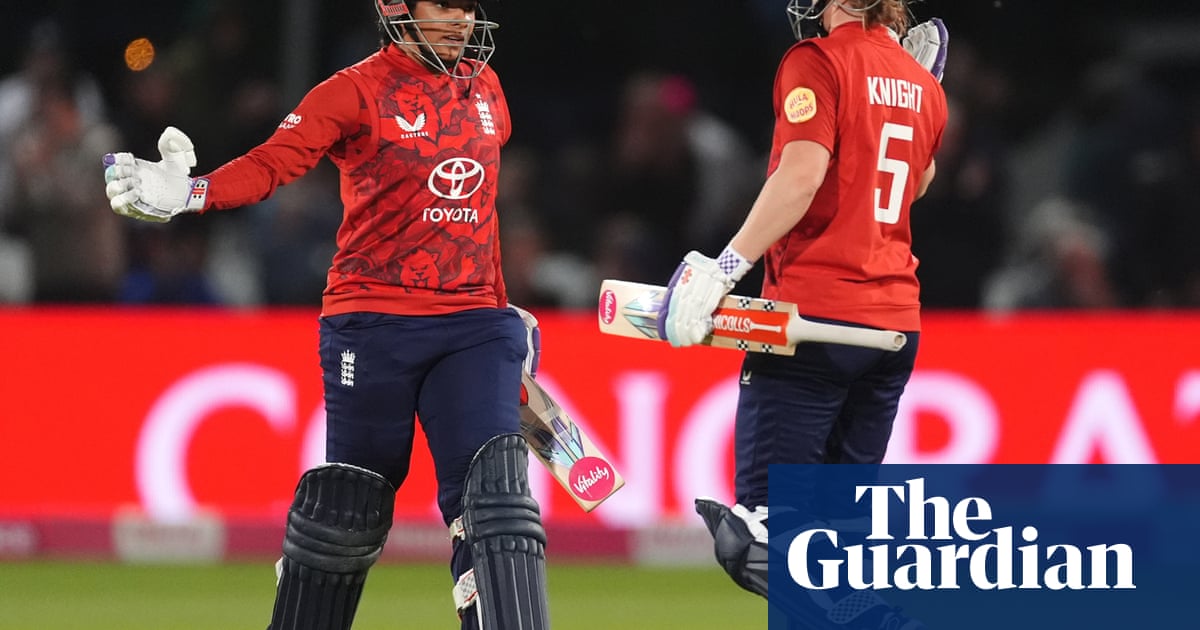This was supposed to be all about England: a first chance to assess how this team will fare under the new head coach, Charlotte Edwards, andnew captain, Nat Sciver-Brunt. And no doubt, Edwards will be pleased that her reign began with an eight-wicket win, especially as this was a homecoming of sorts for the former Kent captain. As for Sciver-Brunt and her team? They will probably just be relieved to experience their first taste of victory in five months.
But despite England’s comfortable win (brought up with 21 balls to spare), spearheaded by a confident unbeaten 81 from Sophia Dunkley and featuring a wicket on debut for the 27-year-old Warwickshire seamer Em Arlott, there was only one star of the show: West Indies captain Hayley Matthews, who calmly brought up a century off the final ball of the innings, finishing unbeaten on exactly 100.
One hundred runs out of a team total of 146; 17 boundaries to Matthews while her teammates scored just five between them. Matthews is by now used to bearing the weight of the team she has captained for three years – epitomised by her refusal to take singles in the final over here, as she eyed up three figures – but this was a particularly extreme example of having to focus on her own game, in the face of chaos at the other end.
If England had looked all at sea in the field againstthese same opponentsin the World Cup last October, here the tables were turned, with two West Indian batters run out and the rest swinging wildly, looking as if they were still reeling from last month’s failure to qualify for this year’s 50-over World Cup. None looked more clueless than the 20-year-old debutant, Realeanna Grimmond, who was run out by Sciver-Brunt’s throw from mid-on after obliviously wandering out of her ground in search of a second run, without a scooby where the ball might have ended up.
England, in reply, strolled to victory – the only downbeat note being the duck scored by their new skipper, who edged a sweep behind the stumps and was sent packing by a smart West Indies DRS review. On the other side of the balance sheet, though, was a chanceless knock of 43 not out from her predecessor, Heather Knight, seemingly quite content to find herself back in the ranks.
If Edwards wanted to make a statement that things had changed since the disaster of the Ashes winter, she could scarcely have made a stronger one: a cap for Arlott; Issy Wong back playing in a full-strength England side after a two-year absence; leg-spinner Sarah Glenn on the bench; and the previously ever-present Sophie Ecclestone not even in the squad.
And her players responded in kind: England’s nemesis Qiana Joseph – who was dropped five times en route to the half-century which sent England packing from the 2024 World Cup – was dismissed first, well held by Linsey Smith at point. Sciver-Brunt then helped herself to catches at deep midwicket and cover, handing Wong and Arlott a wicket apiece, as West Indies’ middle order crumbled. The mysterious absence of Deandra Dottin, who was omitted from the West Indies squad for this tour without explanation, did nothing to help.
Rain clouds had earlier threatened to disrupt this match – but for now, the sun shines on England’s new-look era. They go again on Friday, in the second T20 at Hove.
